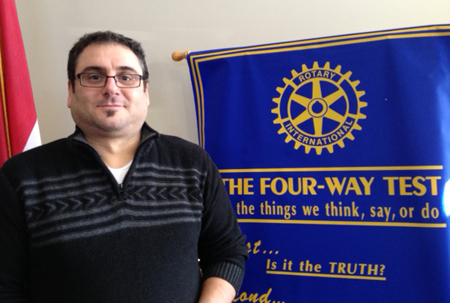
Kalaitzidis is the first faculty member to be named a Rotary Peace Fellow. (Photo submitted)
Story by Mitchell Brown, for The Muleskinner—
The recipient is Akis Kalaitzidis, professor of political science who focuses heavily on international issues.
Jim Staab, professor and chair of the department of government, international studies and languages, said that Kalaitzidis being named a Peace Fellow by Rotary International will raise the profile of the department and garner more attention for UCM.
Kalaitzidis, who began teaching at UCM in 2004, has authored several books, on subjects ranging from U.S. foreign policy to global finance. His international focus extends beyond published works and teaching.
He was born in Greece and has lived in Ireland, Denmark, Spain, the Netherlands, Belgium and Germany.
Kalaitzidis has also done philanthropic outreach work and taught at the university level in Ghana.
In the fall of 2011, Kalaitzidis was the director of the Missouri-Africa Study Abroad program. Kalaitzidis worked with an outreach program called Mawuvios.
The humanitarian work he did consisted of collecting and distributing school supplies and necessities for orphaned children in Ghana.
Having been chosen as a Rotary International Peace Fellow, Kalaitzidis will have the opportunity to travel abroad again, this time to Bangkok, Thailand, more or less returning to a student role.
During his upcoming stay in Thailand at the Peace Fellowship, he will study international issues and conflict resolution, with the aim of working to affect global peace processes.
Mark Pearce, governor of Rotary International District 6080, said some of the possible topics could be the Arab/Israeli conflict, issues pertaining to Eastern Europe, environmental issues, or the democratic process in developing nations.
Pearce said he doesn’t know for certain what the topics will be, but he said those are a few possibilities. “These are all things Rotary is active in looking at,” Pearce said. The fellowship courses are set to take place in the summer of 2013 at Chulalongkorn University.
Kalaitzidis explained that the program will be divided into sections.
He said the first part will consist of four weeks of study, and then what was learned in that month of study will be applied to a region outside of Thailand. After that, study will resume for another four weeks, followed by outreach work in Thailand.
Kalaitzidis described a rigorous selection process that started with him submitting an application and then meeting with local Rotary representatives, followed by a meeting with a regional Rotary committee in Columbia, Mo. Only 25 applicants were chosen. “I was very fortunate to be selected,” Kalaitzidis said.
In a letter of recommendation written on Kalaitzidis’ behalf, Rotary member Duane Sterling wrote that Kalaitzidis would bring a needed element to the program.
“His academic background will add a scholarly perspective to the class whereas many of the other fellows will possess first-hand personal experience that will be of great benefit to him,” Sterling said.
The subjects Kalaitzidis has taught are just as varied as his world travels.
He’s taught courses on international relations, the European Union, American foreign policy, post-communist transitions and other similar subjects.
He said his course that usually draws the most attention from students is American foreign policy.
Kalaitzidis mentioned that not all of his courses receive equal student attention.
He said he has noticed a declining interest in his course on post-communist transitions in Eastern Europe.
He said it’s been six years since he last taught it. “It’s been a struggle to get people to be interested in what Russia used to be,” Kalaitzidis said.
He added the reason for the lack of interest in the subject can be attributed to most college students today being born in the post-Cold War era.
“They don’t understand what communism means,” he said. “They don’t live with it; it doesn’t exist anymore on a global scale.” Kalaitzidis said there are a lot of lessons to be learned from the Cold War era. “But we move on,” he said.
Kalaitzidis said his courses provide a way for students to learn more about globalism, not just in relation to the online technology they have daily interaction with, but also in regards to issues of government, economics and foreign policy.
He stated that an understanding of glo-balism is part of becoming a global citizen, and he suggested for students to take advantage of international study opportunities, just as he is doing once again.


Leave a Reply